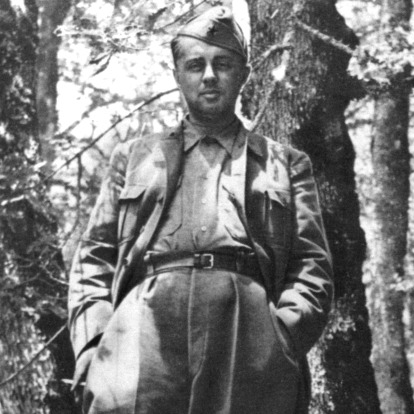"Reflections on the Middle East" is a book
containing short reflections on various Mideast topics penned by the leader of
socialist Albania, Enver Hoxha. The book covers the entire period from 1958 to
1983. Hoxha comments on the Algerian war, the Israeli-Palestinian conflict,
developments in Egypt, the Iranian revolution and the Soviet invasion of
Afghanistan. There is also an extended article in which Hoxha expresses his
great admiration for Arab and Persian culture.
Enver Hoxha's Communist regime in Albania broke with the Soviet Union after the death of Stalin and instead allied itself with China. After the death of Mao Zedong, Albania fell out with China as well, and became relatively isolated on the international arena. Hoxha's hostility to both the United States, the Soviet Union and China explains his political positions, which are sometimes rather surprising.
Thus, he expresses support for both the PLO, Khomeini's Iran and the Afghan resistance against the Soviet Union. In the reflections, Hoxha becomes progressively more dissatisfied with Nasser, and strongly supports Sadat's move to expell all Soviet advisors from Egypt. Of course, Sadat's subsequent peace settlement with Israel came as something of a cold shower. The reflections on Iran are initially critical of Khomeini and supportive of the pro-Albanian group "Toufan", but eventually becomes pro-Khomeini, even supporting Iran against Iraq in the Iran-Iraq war. (Pro-Albanian Communist groups around the world were split on Iran. Some disagreed with Hoxha's change of line and supported Iraq instead!) Khomeini's stand against both the United States and the Soviet Union may have been what commended him to Hoxha.
More surprising still is Hoxha's (muted) support for a two-state settlement in the Israeli-Palestinian conflict, although it's possible that he later changed his mind and started to support "democratic secular Palestine". This is never clearly spelled out in the reflections, however.
Less surprising, perhaps, is Hoxha's almost hysterical condemnation of Ahmed Ben Bella and his strong approval of Boumedienne's coup. Ben Bella had close relations with both Tito and Khrushchev, and attempted to mimic the Yugoslav experiment with "socialist self-management". Hoxha virtually salivates over Ben Bella's downfall, although it's less clear what he subsequently thought of Boumedienne. Another outburst is reserved for Hua Guofeng, presumably because of his break with Albania and warm embrace of Tito (who else?).
On a lesser note, "Reflections on the Middle East" shows that Albania didn't want to completely isolate itself. The Communist regime had a merchant fleet which used the Suez Canal and sent trade delegations to both Turkey and Iraq. The book also shows that Hoxha was perennially worried about a possible Soviet attack on Albania.
Frankly, "Reflections on the Middle East" is a terribly boring book, unless you know what to look for and have a strong interest in the rather narrow subject of Albanian foreign policy.

No comments:
Post a Comment